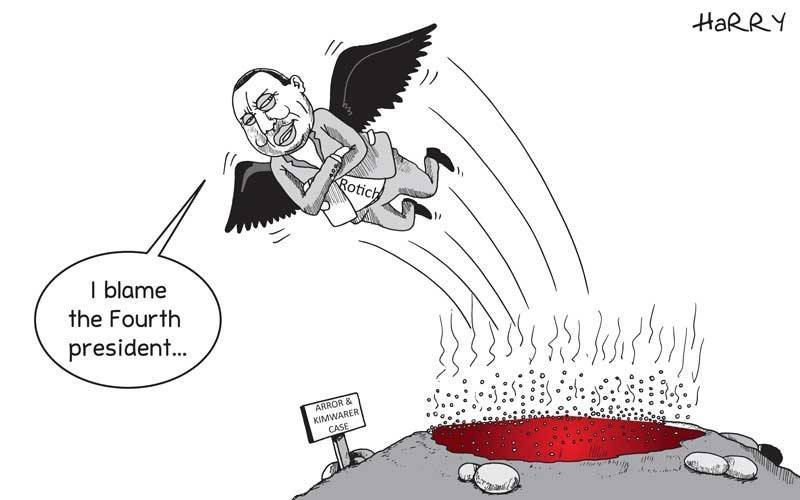 |
|
National Treasury Secretary Henry Rotich. |
A tax civil society has sued National Treasury Secretary Henry Rotich over an ‘illegal’ agreement signed with Mauritius, in a major litigation that could affect thousands of companies operating in Kenya.
The suit filed at the High Court by Tax Justice Network-Africa (TJN-A) demands that Rotich withdraws a taxation treaty entered in 2012 which allows multinationals to either pay taxes in Kenya or Mauritius if they have operations in both jurisdictions. Through its Executive Director Alvin Mosioma, the society says the treaty is open to abuse as it would help companies evade taxes.
The constitution
“The petitioner avers that, as drawn, the agreement breaches, contravenes or threatens the principles of good governance, sustainability and accountability and therefore offends, breaches and contravenes the Constitution and is open to abuse,” reads the petition in part. Gitobu Imanyara is the advocate acting for the petitioners in the suit that has the Kenya Revenue Authority and the Attorney General as the second and third respondents.
The initial agreement that Mr Mosioma’s society is now challenging was entered in 2012 between Kenya and Mauritius by then Finance minister Njeru Githae. Specific details of the agreement were that Kenya committed to allow multinationals that have operations in both countries to decide where between the two jurisdictions they would elect to pay their taxes – technically known as a Double Taxation Treaty (DTA). That agreement was ratified in May 2014, through a legal notice in a step that enabled its enforcement.
Several Kenyan firms have now set up subsidiaries in the Indian Ocean island State to benefit from the treaty, among them Mini Bakeries – the makers of Supa Loaf. Countries sign DTAs to avoid the harmful effects of double taxation on the movement of capital and inter-country economic relations in general.
Tax treaties cover income taxes including withholding tax and capital gains as well as inheritance taxes, value-added taxes and other taxes. However, in many cases, DTAs facilitate tax evasion by individuals and companies using multiple jurisdictions. Mauritius has ratified this agreement and is awaiting Kenya’s nod.
Mr Mosioma argues in the petition that the avenues of abuse of the treaty are numerous and would encourage even local firms to stop paying taxes locally. “...domestic Kenyan investors can dodge Kenyan tax by round-tripping their investments illicitly through a Mauritian shell company,” he says in the petition.
Among the pleas he wants the High Court to determine is differences in taxation laws in the two countries, where any reasonable investor would prefer declaring their profits in the lower tax rate jurisdiction.
In Mauritius for instance, there are no taxes on capital gains whereas investors in Kenya are required to pay 5 per cent. TJN-A says that the differential in taxes on capital gains was costing India about $600 million (Sh53.4 billion) in lost revenue every year, and Mauritius stands accused.
Evade taxes
Previously, other multinationals operating in Kenya exploited comparable opportunities presented in countries such as the Jersey Islands in a perfectly legal means to reduce or totally evade taxes in Kenya. But KRA has since 2005 tried to take on such companies in a seesaw seeking to increase portion of the taxes paid to Kenya.
A transfer-pricing unit has since been established to check how diligently the companies are declaring their earnings and profits; and subsequently their fair taxes payable in Kenya.
But Mr Rotich in a recent interview with The Standard stood by the treaty, claiming that its benefits far outweighed the revenue losses.
“Through this treaty, we are encouraging direct capital investment which will bring with it hard currency and jobs for our local people,” Rotich told The Standard last week.
Stay informed. Subscribe to our newsletter
His ministry is, however, yet to draw up a cost-benefit analysis of the treaty, he said on the sidelines of an event where Kenya restated its national accounts last week.
Githae said in defence of the agreement that it would raise the competitiveness of Kenyan companies to be at par with those of other African countries already having tax treaties with Mauritius, such as Botswana, Uganda and South Africa.
 The Standard Group Plc is a
multi-media organization with investments in media platforms spanning newspaper
print operations, television, radio broadcasting, digital and online services. The
Standard Group is recognized as a leading multi-media house in Kenya with a key
influence in matters of national and international interest.
The Standard Group Plc is a
multi-media organization with investments in media platforms spanning newspaper
print operations, television, radio broadcasting, digital and online services. The
Standard Group is recognized as a leading multi-media house in Kenya with a key
influence in matters of national and international interest.
 The Standard Group Plc is a
multi-media organization with investments in media platforms spanning newspaper
print operations, television, radio broadcasting, digital and online services. The
Standard Group is recognized as a leading multi-media house in Kenya with a key
influence in matters of national and international interest.
The Standard Group Plc is a
multi-media organization with investments in media platforms spanning newspaper
print operations, television, radio broadcasting, digital and online services. The
Standard Group is recognized as a leading multi-media house in Kenya with a key
influence in matters of national and international interest.








